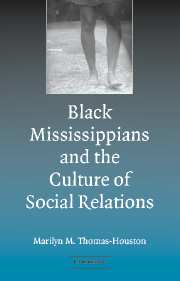Book contents
- Frontmatter
- Contents
- Preface
- Acknowledgments
- Introduction
- PART ONE THE CULTURAL HISTORY AND SOCIAL STRUCTURE OF THE REGION
- PART TWO SOCIAL CONSCIOUSNESS, SOCIAL ACTION
- 3 Social Consciousness and Black Public Culture
- 4 Social Action: A Social Movement in Practice
- PART THREE CONSTRUCTION OF AN INTRARACIAL IDENTITY
- Conclusion
- Appendix A Lafayette County Population Chart
- Appendix B Proclamation Honoring Ole Miss Demonstrators
- Appendix C Chancellor's Statement of Commendation
- Appendix D Speech by Susie Marshall for Second Baptist Church Honoring Rev. Blind Jim Ivy
- Appendix E Susie Marshall's Unpublished Draft of Freedman Town Marker Dedication Speech Recounting July 4, 1867, Speech of Oxford Ex-slave
- Bibliography
- Index
3 - Social Consciousness and Black Public Culture
Published online by Cambridge University Press: 23 December 2009
- Frontmatter
- Contents
- Preface
- Acknowledgments
- Introduction
- PART ONE THE CULTURAL HISTORY AND SOCIAL STRUCTURE OF THE REGION
- PART TWO SOCIAL CONSCIOUSNESS, SOCIAL ACTION
- 3 Social Consciousness and Black Public Culture
- 4 Social Action: A Social Movement in Practice
- PART THREE CONSTRUCTION OF AN INTRARACIAL IDENTITY
- Conclusion
- Appendix A Lafayette County Population Chart
- Appendix B Proclamation Honoring Ole Miss Demonstrators
- Appendix C Chancellor's Statement of Commendation
- Appendix D Speech by Susie Marshall for Second Baptist Church Honoring Rev. Blind Jim Ivy
- Appendix E Susie Marshall's Unpublished Draft of Freedman Town Marker Dedication Speech Recounting July 4, 1867, Speech of Oxford Ex-slave
- Bibliography
- Index
Summary
Social consciousness often becomes the focus of organizers and organizations looking to create social change. Organizers frequently assume that simply bringing the issue to the attention of community members will provide the impetus for mobilization, and as such those who do not join the effort do not understand the need for action. That assumption, I believe, is the primary reason that studies of social movements focus on the consciousness-raising aspect of mobilization. Sometimes, however, this model does not hold true. In this chapter, I present examples where consciousness exists but social action does not occur.
African Americans as a diasporic group have struggled throughout their existence against their subordinate state. On the individual or group grassroots level, their particular struggles have historical, regional, and ideological roots. After slavery, African Americans formed a tremendous number of organizations to address their social, political, and economic problems. These associations, societies, clubs, and religious and political groups formed the body of the Black public sphere. This vast effort to organize demonstrates that African Americans do not lack social consciousness, but rather that there exists a complex mix of ideological diversity, social relations, intimate culture groups, and power relations that influence efforts to mobilize around issues important from an objective perspective on the community level.
The social and civic organizations (public and exclusionary) that constitute the structure of Black society are both helpful and harmful (often simultaneously) to both identification of the problem and the subsequent actions that follow.
- Type
- Chapter
- Information
- 'Stony the Road' to ChangeBlack Mississippians and the Culture of Social Relations, pp. 69 - 98Publisher: Cambridge University PressPrint publication year: 2004



